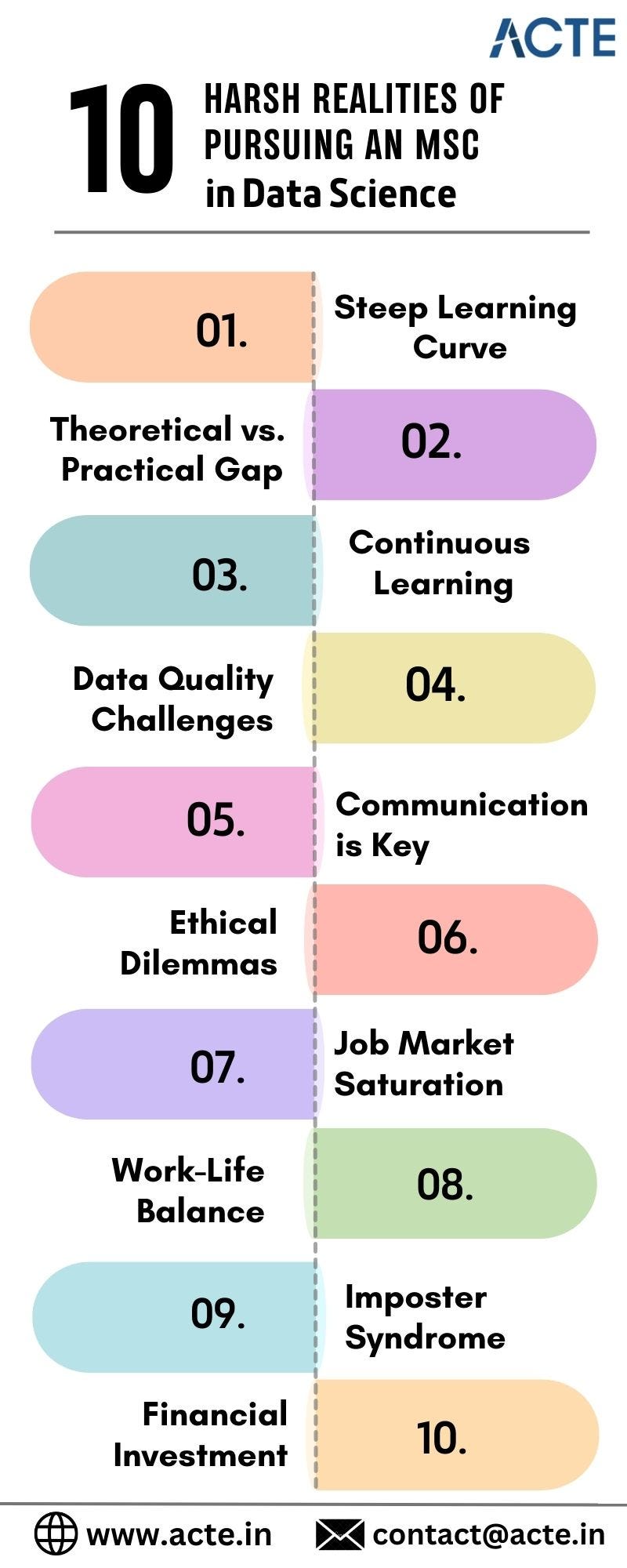Facing the Tough Realities of an MSc in Data Science
So, you've made the bold decision to pursue a Master of Science (MSc) in Data Science. It's an exhilarating journey ahead, filled with the promise of diving into the vast world of data analysis, machine learning, and uncovering valuable insights. But amidst the excitement, there are some harsh realities that every aspiring data scientist should be prepared to confront. If you want to advance your career at the Data Science Training in Pune, you need to take a systematic approach and join up for a course that best suits your interests and will greatly expand your learning path.

Let's delve into them.
Challenging Learning Curve: Brace yourself for an academically demanding ride. Data science blends various disciplines like statistics, mathematics, and computer science, making the learning curve steep. Get ready to dive into complex algorithms, programming languages such as Python and R, and diverse analytical techniques. For those looking to excel in Data Science, Data Science Online Training is highly suggested. Look for classes that align with your preferred programming language and learning approach.
Theory vs. Practice Gap: While your MSc program will provide a solid theoretical foundation, applying that knowledge in real-world scenarios can be quite different. Many programs emphasize theory, leaving students to bridge the gap between academic learning and practical implementation.
Continuous Learning: Data science is a rapidly evolving field. What you learn today may become outdated tomorrow. Committing to lifelong learning is essential to stay relevant and updated with the latest tools, technologies, and methodologies.
Data Quality Challenges: Real-world data is often messy, with missing values, outliers, and inconsistencies. Cleaning and preprocessing data can be time-consuming, and even then, achieving perfect data quality is uncertain.
Importance of Communication: Data science isn't just about crunching numbers; it's about effectively communicating insights. Strong communication skills are crucial for conveying complex analyses to non-technical stakeholders and driving decision-making.
Ethical Considerations: As a data scientist, you'll handle sensitive information, raising ethical concerns about data privacy, bias, and fairness. It's vital to prioritize ethical considerations in every stage of the data analysis process.
Competitive Job Market: While the demand for data scientists is high, so is the competition. Securing desirable job opportunities requires standing out with unique skills and experiences amidst a crowded job market.
Work-Life Balance: Data science projects can be demanding, often requiring long hours of coding and problem-solving. Balancing academic commitments with personal life necessitates effective time management and prioritization skills.
Imposter Syndrome: Many aspiring data scientists experience imposter syndrome, feeling inadequate compared to others in the field. Remember that everyone starts somewhere, and setbacks are part of the learning journey.
Financial Investment: Pursuing an MSc in Data Science entails significant financial costs, including tuition fees and living expenses. Consider the potential return on investment against the financial outlay and opportunity cost of not working full-time.

In summary, while embarking on an MSc in Data Science opens doors to exciting opportunities, it's crucial to acknowledge and prepare for the challenges ahead. With resilience, adaptability, and a commitment to continuous learning, you can navigate the complexities of the field and forge a successful career in data science.